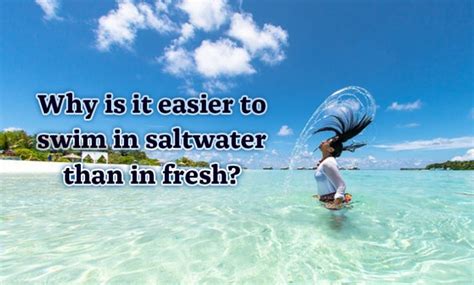Is It Easier To Swim In Salt Water
News Leon
Mar 28, 2025 · 4 min read

Table of Contents
Is It Easier to Swim in Salt Water? Buoyancy, Density, and the Science of Aquatic Ease
The question of whether it's easier to swim in salt water versus fresh water is a common one, sparking debates among seasoned swimmers and curious beginners alike. The short answer is yes, it generally is easier to swim in salt water. But understanding why requires a dive into the fascinating world of buoyancy, density, and the physics that govern our movements in water.
Understanding Buoyancy: The Power of Upward Force
Buoyancy is the upward force exerted on an object submerged in a fluid (like water). This force is equal to the weight of the fluid displaced by the object – this is Archimedes' principle, a cornerstone of physics. The greater the volume of water displaced, the greater the buoyant force.
Think of it this way: when you enter a pool, the water is essentially supporting a portion of your weight. The more water you displace, the more support you receive. This is why larger objects, or objects with a greater volume, experience a greater buoyant force.
Density: The Key to Salt Water's Superior Buoyancy
The crucial difference between salt water and fresh water lies in their density. Salt water is denser than fresh water because dissolved salts add mass to the same volume of water. This increased density is the primary reason why swimming in salt water feels easier.
Here's the breakdown:
-
Higher Density = Greater Buoyant Force: Because salt water is denser, it exerts a stronger upward buoyant force on your body. This means a greater portion of your weight is supported by the water, requiring less effort from your muscles to stay afloat.
-
Less Effort, More Float: This reduction in effort translates to easier swimming. You'll find it simpler to maintain a horizontal position, kick with less intensity, and overall experience a smoother, more effortless swim.
Density Differences: A Numerical Perspective
While the exact density varies depending on salinity levels (the concentration of salt), seawater typically has a density around 1.025 g/cm³, whereas fresh water has a density of approximately 1.00 g/cm³. This seemingly small difference in density translates to a significant difference in buoyant force, making a noticeable impact on your swimming experience.
Beyond Density: Other Factors Affecting Swimmability
While density is the most significant factor, several other elements contribute to the perceived ease of swimming in salt water:
Salinity and Body Composition
The higher salinity of seawater can affect your body's hydration levels. While not directly impacting buoyancy, slight changes in body composition due to osmotic effects might contribute to a subtle difference in perceived effort.
Water Temperature
Water temperature significantly impacts swimming experience. Warmer water generally feels more comfortable, making it easier to relax and focus on your technique. The temperature of saltwater and freshwater bodies can vary geographically and seasonally, influencing individual experiences.
Body Fat Percentage
Your individual body composition also plays a role. People with higher body fat percentages naturally experience greater buoyancy due to fat's lower density compared to muscle or bone. This inherent buoyancy makes swimming easier regardless of the water type.
Swimming Technique
Finally, and perhaps most importantly, swimming technique dictates your overall effort level. A strong and efficient technique will always make swimming easier, irrespective of whether you're in salt water or fresh water. Mastering proper body position, breathing, and stroke technique is paramount for an enjoyable and less strenuous swim.
Practical Implications and Considerations
The enhanced buoyancy of salt water translates into several practical benefits:
-
Learning to Swim: Salt water's buoyancy provides a more forgiving learning environment for beginners. The increased support makes it easier to develop proper technique and build confidence in the water.
-
Water Activities: Many water-based activities, like paddleboarding or kayaking, are easier in salt water due to the increased buoyancy.
Debunking Myths and Addressing Common Misconceptions
Several misconceptions surround swimming in salt water:
-
Myth 1: Salt Water is Always Warmer: While many saltwater bodies are situated in warmer climates, water temperature depends on various factors including location, season, and depth.
-
Myth 2: Salt Water is Always Cleaner: Salinity doesn't necessarily equate to cleanliness. Salt water can still contain pollutants and microorganisms.
-
Myth 3: Salt Water is Always Easier for Everyone: While generally easier, individual body composition, swimming skill, and water temperature still play crucial roles in determining swimming ease.
Conclusion: The Salt Water Advantage
In conclusion, while various factors influence swimming ease, the higher density of salt water provides a significant advantage, leading to a more buoyant and effortless swimming experience for most individuals. This increased buoyancy makes it easier to float, reducing the physical effort required to stay afloat and propel oneself through the water. While mastering proper swimming technique remains crucial, salt water undeniably offers a more forgiving and enjoyable aquatic environment, particularly for beginners or individuals seeking a less strenuous workout. However, remember that water conditions vary greatly, and individual factors always play a significant role.
Latest Posts
Latest Posts
-
Condensed Structural Formula For 1 2 Dibromoethane
Mar 31, 2025
-
What Two Factors Does Air Pressure Depend On
Mar 31, 2025
-
Which Lewis Electron Dot Diagram Is Correct For Co2
Mar 31, 2025
-
Which Statement Is True About Obligate Anaerobes
Mar 31, 2025
-
How Many Lines Of Symmetry Circle
Mar 31, 2025
Related Post
Thank you for visiting our website which covers about Is It Easier To Swim In Salt Water . We hope the information provided has been useful to you. Feel free to contact us if you have any questions or need further assistance. See you next time and don't miss to bookmark.
